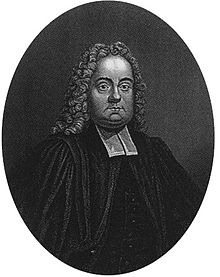Difference between revisions of "Matthew Henry's Concise Bible Commentary"
| Line 7: | Line 7: | ||
Matthew Henry(October 18, 1662 June 22, 1714) was an English commentator on the Bible and [[Presbyterian]] minister. Born near [[Wales]] on October 18, 1662, he was primarily home-educated by his father, Rev. Philip Henry, and also at the Thomas Doolittle academy from 1680-1682. Henry first started studying law in 1686, but instead of pursuing a career in law he began to preach in his neighborhood. | Matthew Henry(October 18, 1662 June 22, 1714) was an English commentator on the Bible and [[Presbyterian]] minister. Born near [[Wales]] on October 18, 1662, he was primarily home-educated by his father, Rev. Philip Henry, and also at the Thomas Doolittle academy from 1680-1682. Henry first started studying law in 1686, but instead of pursuing a career in law he began to preach in his neighborhood. | ||
| − | After the declaration of liberty of conscience by James II in 1687, he was privately ordained in [[London]], and on June 2, 1687, he began his regular ministry as non-conformist pastor of a Presbyterian congregation at [[Chester]]. He remained in this position for 25 years. After declining several times offers from London congregations, he finally accepted a call to Hackney, London, and began his ministry there May 18, 1712, shortly before his death. | + | After the declaration of liberty of conscience by James II in 1687, he was privately ordained in [[London]], and on June 2, 1687, he began his regular ministry as non-conformist pastor of a Presbyterian congregation at [[Chester]]. He remained in this position for 25 years. After declining several times offers from London congregations, he finally accepted a call to Hackney, [[London]], and began his ministry there May 18, 1712, shortly before his death. |
| − | Henry's reputation rests upon his renowned commentary, An Exposition of the Old and New Testaments (1708-10, known also as Matthew | + | Henry's reputation rests upon his renowned commentary, An Exposition of the Old and New Testaments (1708-10, known also as [[Matthew Henry Commentary on the Whole Bible]]). He lived to complete it only as far as to the end of the Acts, but after his death other like-minded authors prepared the remainder from Henry's manuscripts. This work was long celebrated as the best English commentary for devotional purposes and the expanded edition was initially published in 1896. Instead of critical exposition, Henry focuses on practical suggestion, and his commentaries contains rich stores of truths. There is also a smaller devotional commentary on the Bible from Henry known as Matthew Henry’s Concise Commentary. |
==External links== | ==External links== | ||
Revision as of 15:03, 18 October 2015
Matthew Henry's Concise Commentary an abdridged version of the more detailed 6 volume Bible Commentary originally created by Matthew Henry. This work as well as the full version of the Matthew Henry's Bible Commentary are in the public domain and are available for download from many sources on the internet including CCEL.
Matthew Henry(October 18, 1662 June 22, 1714) was an English commentator on the Bible and Presbyterian minister. Born near Wales on October 18, 1662, he was primarily home-educated by his father, Rev. Philip Henry, and also at the Thomas Doolittle academy from 1680-1682. Henry first started studying law in 1686, but instead of pursuing a career in law he began to preach in his neighborhood.
After the declaration of liberty of conscience by James II in 1687, he was privately ordained in London, and on June 2, 1687, he began his regular ministry as non-conformist pastor of a Presbyterian congregation at Chester. He remained in this position for 25 years. After declining several times offers from London congregations, he finally accepted a call to Hackney, London, and began his ministry there May 18, 1712, shortly before his death.
Henry's reputation rests upon his renowned commentary, An Exposition of the Old and New Testaments (1708-10, known also as Matthew Henry Commentary on the Whole Bible). He lived to complete it only as far as to the end of the Acts, but after his death other like-minded authors prepared the remainder from Henry's manuscripts. This work was long celebrated as the best English commentary for devotional purposes and the expanded edition was initially published in 1896. Instead of critical exposition, Henry focuses on practical suggestion, and his commentaries contains rich stores of truths. There is also a smaller devotional commentary on the Bible from Henry known as Matthew Henry’s Concise Commentary.
External links
MHC Concise Bible Dictionary on CCEL Text | PDF | HTML
This article is a stub. You can help WikiChristian by expanding it. For help please read the WikiChristian Tutorial and our writing guide.
